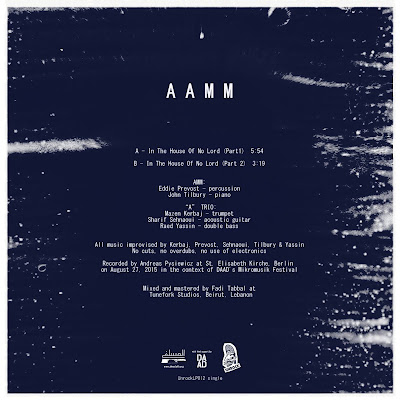Label: Côte D'Azur – CDA 02
Format: Vinyl, LP, Album / Country: France / Released: 1981
Style: Free Jazz, Musique Concrète, Experimental
Recorded and Mixed by Michel Redolfi in Marseille at GMEM Studios.
Artwork / Re-Design By [Cover Design] – V. Salvarica
Photography – Bragoni, Canavaggio, Pajot
Recorded By, Mixed By – Michel Redolfi
Producer – Philippe Conrath
Executive Producer – D. Buscail, Ph. Caviglio
Composed By – André Jaume / Michel Redolfi
Matrix / Runout (Side A): CDA 02 A- I
Matrix / Runout (Side B): CDA 02 B-II
side 1
A1 - André Jaume – Cupabia .................................................................................. 10:15
part 1 Asciuma
part 2 Ventitellu
part 3 Timporale
A2 - André Jaume – Opalescence ........................................................................... 4:45
A3 - André Jaume – Ballade Pour Hector ................................................................ 4:42
side 2
B1 - Michel Redolfi – Naissance Et Agonie De Ma Lampe De Chevet .................... 9:45
B2 - Michel Redolfi – Hardscore ............................................................................. 10:37
(text by – Lanie Goodman)
Personnel:
André Jaume – bass larinet / tenor saxophone
Michel Redolfi – synthesizer [synclavier digital synthesizer]
Jean-Marc Montera – guitar
Jacques Diennet – keyboards
Frank Royon Le Mée – vocals
Much more known for his aquatic electroacoustic environments including albums for that genre's landmark Ina/GRM imprint, it seems Michel Redolfi's association with the largely free music-focused imprint Hat Hut which issued his first album had the knock-on effect of bringing him together with both sax and clarinet improvisor Jaume (whose CV includes recordings with Joe Mcphee, Raymond Boni and Charlie Mariano) and the passel of improvisors more readily associated with the label during the early 80's, including guitarist Marc Montera and second keyboardist Jacques Diennet, who'd later join forces again for Diennet's 1987 Hat Hut-issued LP boxset Mante, though Hardscore itself wasn't actually issued on that label.
Jaume's compositions comprise side A, Redolfi's side B, though both appear throughout. The Jaume-penned outing on side A is splendid: a rambunctious and splutteringly digestive cartoonish sound clash akin to that deployed by the Un Drame Musical Instantane/GRRR crew that pits Jaume's bass clarinet and tenor sax against playfully gurgling atmospheres from Redolfi which are then cross-hatched and perforated by the fits and spits emitted from guitarist Jean-Marc Montera, second keyboardist Jacques Diennet and vocalist Frank Royon Le Mee. Redolfi's two B-side compositions are things of confounding beauty, stepping away from his understood identity far more than the surges of Michel Waisvisz-like free synth splatter that be brings to bear on Jaume behalf on the A Side. On Naissance Et Agonie De Ma Lampe De Chevet, Redolfi sticks to a background scrim of droning coloration while Frank Royon Le Mee and Jaume use clarinets, sax, delicate acoustic guitar and and vocals of bird-like delicacy and sensitivity to evoke a ritualistic summoning on the spirits, while the title track teases a candy floss of atonal synthetic unguent around Jaume's moist emissions 'til they both explode in a polyphonically saturated and tonally ripe burst of synthetically smeared sax love.
(Review By VDOANDSOUND)
This two-part suite is actually a hidden gem of rogue Acoustic-Electronic interplay & tight, blocky Concrète moves, heavily featuring Redolfi's Synclavier interjections.
If you find it, buy this album!




























